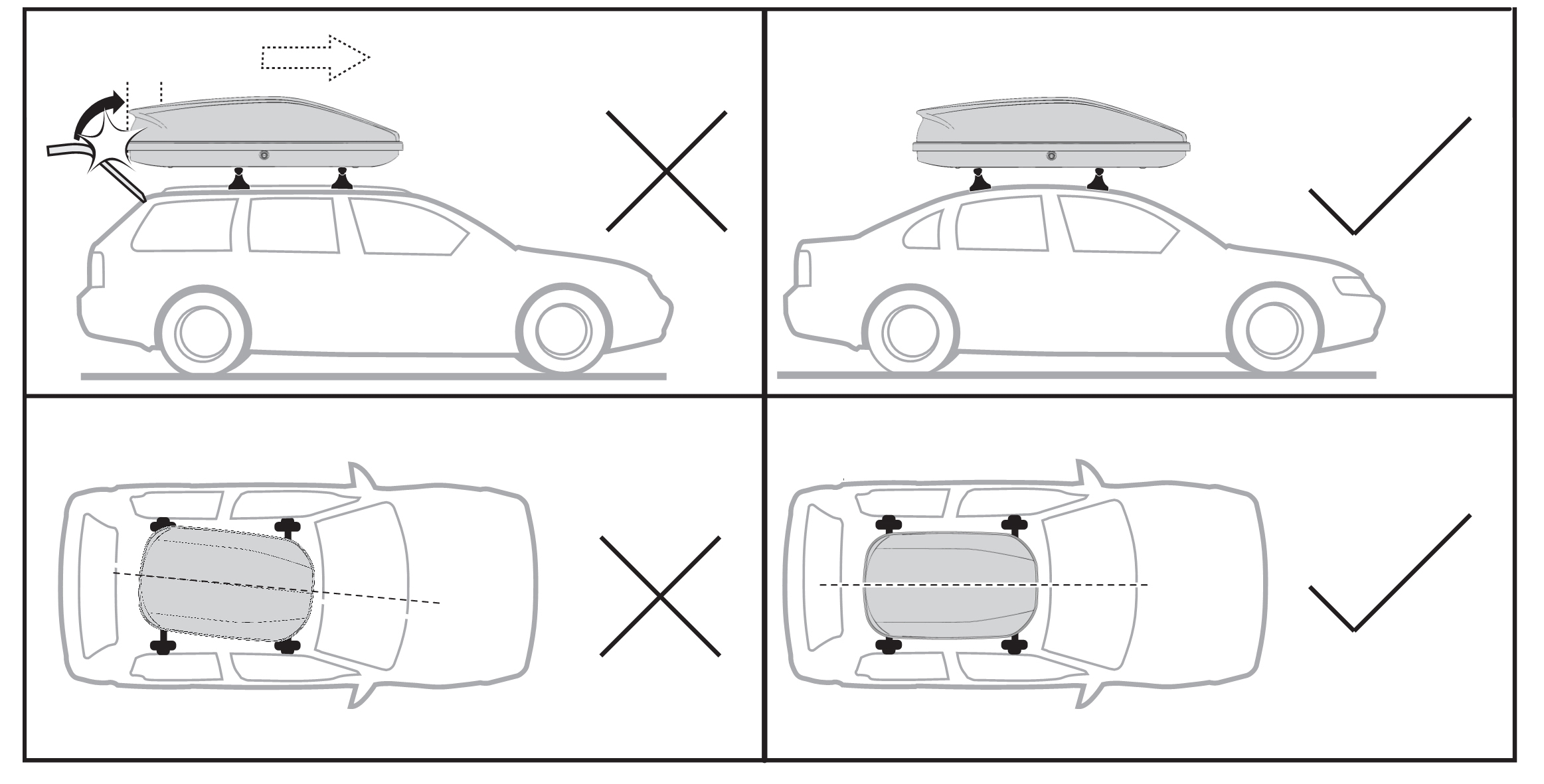Position a roof box in the center of the roof for optimal balance. Ensure it doesn’t obstruct the rear hatch.
A roof box is a practical addition for extra storage during trips. Proper positioning ensures safety and vehicle stability. Centering the roof box distributes weight evenly, preventing swaying and improving aerodynamics. It’s essential to check that the box doesn’t block the rear hatch for easy access.
Installing a roof box correctly can enhance your travel experience by providing ample storage without compromising the vehicle’s performance. Always follow the manufacturer’s guidelines for the best results. Proper placement also reduces wind resistance, which can improve fuel efficiency. Secure all items inside to avoid shifting during transit. A well-positioned roof box makes your journey more convenient and safe.
Introduction To Roof Box Placement
Positioning a roof box correctly is crucial for safety and performance. This guide will help you understand the best practices for roof box placement. Proper placement can improve aerodynamics and ensure your items stay secure.
Why Placement Matters
The placement of a roof box affects your car’s balance and stability. Placing it too far forward or backward can cause driving issues. A well-positioned roof box can reduce drag and improve fuel efficiency. It also helps to distribute the weight evenly, making your ride smoother.
- Improves vehicle balance
- Reduces drag
- Enhances fuel efficiency
- Ensures even weight distribution
Common Mistakes
Avoid placing the roof box too far forward. This can affect your car’s handling. Do not place it too far back either. This can cause imbalance and safety risks.
Another common mistake is overloading the roof box. Always check the weight limits. Improperly secured roof boxes can also be dangerous. Make sure it is tightly fastened.
| Common Mistake | Effect |
|---|---|
| Too far forward | Affects handling |
| Too far back | Causes imbalance |
| Overloading | Exceeds weight limits |
| Improperly secured | Dangerous while driving |

Credit: m.youtube.com
Factors Influencing Placement
Finding the right spot for your roof box can be tricky. Several factors play a role in determining the ideal placement. Understanding these factors ensures your roof box is safe and efficient.
Vehicle Type
The type of vehicle you have affects roof box placement. Different vehicles have unique roof structures and weight limits. Consider these points:
- Sedans: Center the roof box for balanced weight distribution.
- SUVs: Position the roof box towards the middle. This reduces wind resistance.
- Trucks: Place the roof box closer to the cab. It improves stability and reduces drag.
Always check your vehicle’s manual for specific guidelines.
Roof Box Size
The size of your roof box also influences its placement. Larger roof boxes need more careful positioning. Key considerations include:
- Length: Ensure the roof box does not obstruct the rear hatch.
- Width: Make sure the roof box does not overhang the sides.
- Height: Verify that the roof box does not exceed height limits for parking garages.
| Roof Box Size | Recommended Position |
|---|---|
| Small (up to 300 liters) | Center of the roof |
| Medium (300-500 liters) | Middle, slightly towards the rear |
| Large (500+ liters) | Centered with careful front and rear clearance |
Always secure the roof box properly regardless of its size.
Aerodynamics And Fuel Efficiency
Positioning a roof box correctly impacts your car’s aerodynamics and fuel efficiency. A poorly placed roof box can increase drag, leading to higher fuel consumption. Knowing the best spot for your roof box will help you save on fuel and have a smoother drive.
Impact On Fuel Consumption
A roof box affects how much fuel your car uses. Placing it at the front can make your car less aerodynamic. This increases fuel consumption. Instead, place the roof box in the middle or towards the rear. This reduces drag and helps save fuel.
| Position | Fuel Efficiency |
|---|---|
| Front | High fuel consumption |
| Middle | Moderate fuel consumption |
| Rear | Lower fuel consumption |
Wind Resistance
Wind resistance plays a key role in fuel efficiency. Placing the roof box at the front creates more wind resistance. This makes your car work harder and use more fuel. Positioning the roof box in the middle or rear reduces wind resistance.
- Front position: High wind resistance
- Middle position: Balanced wind resistance
- Rear position: Low wind resistance
A well-positioned roof box can make your car more aerodynamic. This leads to better fuel efficiency and a smoother ride.
Credit: www.startmotionmedia.com
Weight Distribution
Proper weight distribution in your roof box ensures safe and efficient driving. Positioning items correctly can prevent accidents and improve fuel efficiency. Let’s dive into the details of weight distribution.
Center Of Gravity
The center of gravity is crucial for vehicle stability. Place heavier items in the middle of the roof box. This keeps the center of gravity low and balanced.
A low center of gravity reduces the risk of rollovers. It also makes steering more responsive. Always secure items to prevent shifting during travel.
Load Balancing
Effective load balancing prevents uneven weight distribution. Distribute the weight evenly across the roof box. This helps maintain vehicle balance and control.
Avoid placing all heavy items on one side. This can cause the vehicle to lean or sway. Instead, place items uniformly for better handling.
Tips for Load Balancing:
- Use tie-down straps to secure items.
- Place lighter items on the sides.
- Keep the roof box organized to avoid weight shifting.
| Item Type | Suggested Placement |
|---|---|
| Heavy Items | Center of the roof box |
| Light Items | Sides of the roof box |
| Medium Weight Items | Evenly distributed |
Safety Considerations
Positioning a roof box correctly is crucial for safety. Incorrect placement can impact driving stability and visibility. It can also make accessing the contents difficult. Understanding safety considerations ensures a smooth and secure journey.
Driver Visibility
Driver visibility must remain unobstructed. Ensure the roof box does not block the rearview mirror. Check that side mirrors are also clear. A blocked view increases the risk of accidents.
Position the box centrally on the roof. This helps maintain balance and keeps the box out of the driver’s line of sight. A well-placed roof box allows the driver to see the road clearly.
Accessibility
Accessibility is another key factor. Place the roof box where you can easily reach it. This is especially important if you need to access it frequently. A centrally positioned box is often the best choice.
Check that the box does not interfere with opening car doors. Ensure you can open the trunk without hitting the roof box. Accessibility ensures you can load and unload items without difficulty.
Installation Best Practices
Installing a roof box correctly ensures safety and efficiency. Proper installation reduces wind resistance and enhances vehicle stability. Follow these best practices for a secure and reliable setup.
Securing The Roof Box
Securing the roof box is crucial for safe travel. Always use the provided brackets and straps. Ensure the box is centered on the roof. This helps balance the vehicle. Double-check all fasteners before driving. Tighten them as needed during your trip.
Using Roof Rails
Roof rails provide a stable base for the roof box. Ensure your vehicle has compatible roof rails installed. Position the roof box evenly between the rails. Use the manufacturer’s mounting system to attach the box securely. Check the weight limits of the rails and the roof box.
| Item | Best Practice |
|---|---|
| Brackets and Straps | Use provided ones for secure attachment |
| Positioning | Center the box on the roof |
| Fasteners | Check and tighten before and during travel |
| Weight Limits | Adhere to the rails and box limits |
Following these steps ensures a safe and efficient journey with your roof box. Always prioritize safety and regularly check the setup.
Testing And Adjustments
Positioning a roof box correctly is crucial for safety and efficiency. This section covers how to test and adjust the placement of your roof box. This ensures an optimal fit and performance.
Trial Runs
Before hitting the road, conduct several trial runs with your roof box. Secure the box and drive around your neighborhood. Observe any changes in vehicle handling or noise levels.
- Check for wind noise
- Monitor vehicle stability
- Ensure secure attachment
Pay attention to corners and uneven roads. This helps identify any potential issues. Adjust the roof box if you notice any instability or noise.
Fine-tuning The Position
After your trial runs, it’s time for fine-tuning the position. Minor adjustments can make a big difference in performance.
- Move the box slightly forward or backward
- Check the balance and distribution of weight
- Ensure the box is centered on the roof
Use a measuring tape to ensure even spacing on both sides. An even weight distribution helps with vehicle balance and fuel efficiency.
| Aspect | Check |
|---|---|
| Weight Distribution | Ensure even weight |
| Attachment | Secure all clamps |
| Noise Levels | Minimize wind noise |
Repeat the trial runs after each adjustment. This ensures your roof box is perfectly positioned.
Credit: www.nuvoicepress.com
Maintenance Tips
Maintaining your roof box ensures its longevity and optimal performance. Follow these simple tips to keep your roof box in top shape. These maintenance tips will help you avoid any issues and extend the life of your roof box.
Regular Inspections
Perform regular inspections to check for any signs of damage. Look for cracks, dents, or loose parts. Ensure the locks and latches are working properly. Inspect the mounting system for wear and tear. Tighten any loose bolts or screws. Regular inspections help prevent unexpected issues while on the road.
Cleaning And Storage
Keep your roof box clean to prevent dirt buildup. Use a mild soap and water solution. Avoid harsh chemicals that can damage the surface. Rinse thoroughly and dry with a soft cloth. Store the roof box in a cool, dry place when not in use. Avoid direct sunlight and extreme temperatures.
Follow these cleaning steps:
- Remove all items from the roof box.
- Wipe down the interior and exterior with a damp cloth.
- Use a soft brush for stubborn dirt.
- Rinse with clean water.
- Dry completely before storage.
Proper storage prevents damage and extends the roof box’s life. Use a storage bag or cover to protect it from dust. Store it off the ground to avoid moisture damage. These simple steps will keep your roof box in excellent condition for years to come.
Frequently Asked Questions
Where Should A Roof Box Be Positioned?
Position the roof box centrally on the roof bars. This ensures balanced weight distribution. Make sure it doesn’t obstruct the car’s aerial or rear hatch.
Does Roof Box Position Affect Aerodynamics?
Yes, incorrect positioning can affect aerodynamics. Place the roof box centrally to minimize wind resistance. This can help improve fuel efficiency.
How Do I Secure A Roof Box?
Ensure the roof box is tightly secured to roof bars. Follow the manufacturer’s instructions. Double-check all locks and fastenings before every trip.
Can A Roof Box Be Too Far Forward?
Yes, a roof box too far forward can obstruct your view. It may also interfere with the operation of the car’s sunroof.
Conclusion
Choosing the right position for your roof box maximizes safety and convenience. Place it centrally for balance and aerodynamics. Always follow manufacturer guidelines for the best results. Proper positioning ensures a smooth and efficient journey. Happy travels with your well-positioned roof box!

